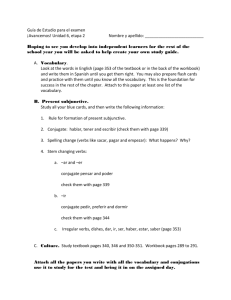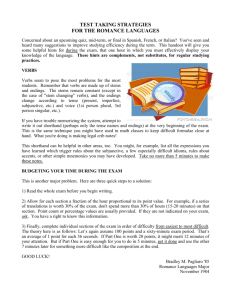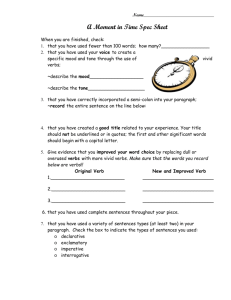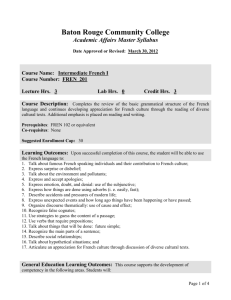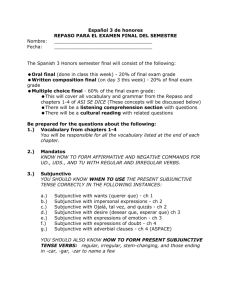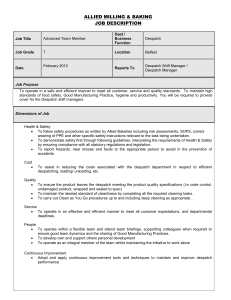Don't Fall Into the Grammar Traps!
advertisement
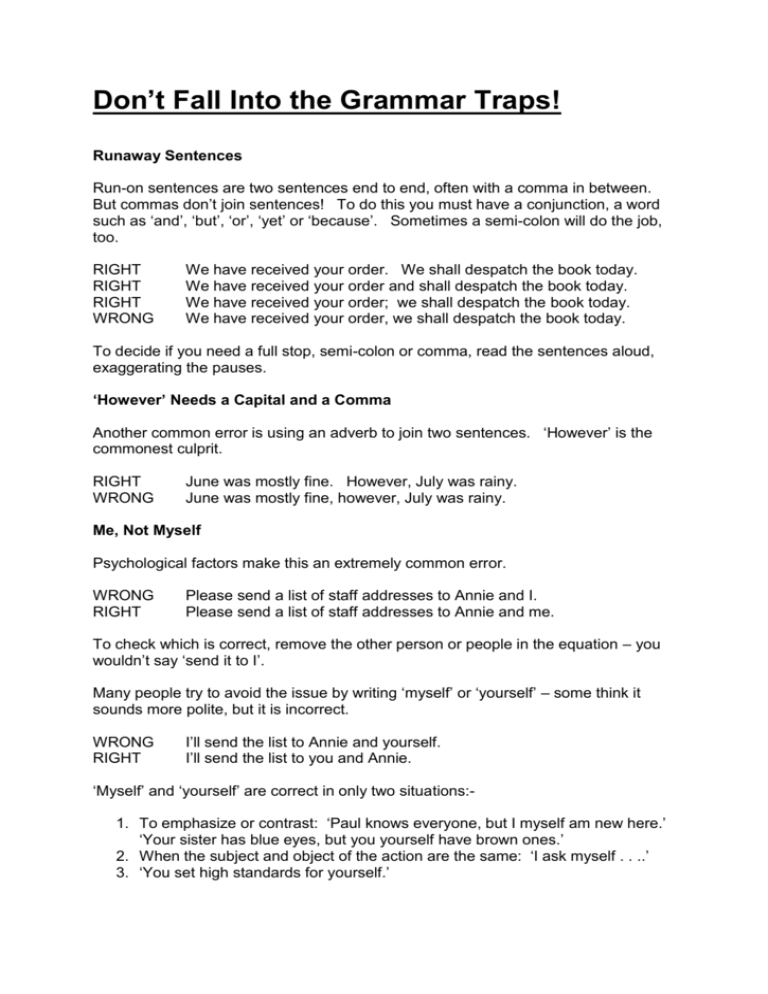
Don’t Fall Into the Grammar Traps! Runaway Sentences Run-on sentences are two sentences end to end, often with a comma in between. But commas don’t join sentences! To do this you must have a conjunction, a word such as ‘and’, ‘but’, ‘or’, ‘yet’ or ‘because’. Sometimes a semi-colon will do the job, too. RIGHT RIGHT RIGHT WRONG We have received your order. We shall despatch the book today. We have received your order and shall despatch the book today. We have received your order; we shall despatch the book today. We have received your order, we shall despatch the book today. To decide if you need a full stop, semi-colon or comma, read the sentences aloud, exaggerating the pauses. ‘However’ Needs a Capital and a Comma Another common error is using an adverb to join two sentences. ‘However’ is the commonest culprit. RIGHT WRONG June was mostly fine. However, July was rainy. June was mostly fine, however, July was rainy. Me, Not Myself Psychological factors make this an extremely common error. WRONG RIGHT Please send a list of staff addresses to Annie and I. Please send a list of staff addresses to Annie and me. To check which is correct, remove the other person or people in the equation – you wouldn’t say ‘send it to I’. Many people try to avoid the issue by writing ‘myself’ or ‘yourself’ – some think it sounds more polite, but it is incorrect. WRONG RIGHT I’ll send the list to Annie and yourself. I’ll send the list to you and Annie. ‘Myself’ and ‘yourself’ are correct in only two situations:1. To emphasize or contrast: ‘Paul knows everyone, but I myself am new here.’ ‘Your sister has blue eyes, but you yourself have brown ones.’ 2. When the subject and object of the action are the same: ‘I ask myself . . ..’ 3. ‘You set high standards for yourself.’ Items on a List Must Be a Matching Set This is another must. A non-parallel list can be ambiguous and vaguely disturbing, besides being grammatically incorrect. A list always has either a heading or a stem. The stem is the beginning of a list, and every item on the list must finish the sentence perfectly. This is true whether or not you use bullet points. WRONG RIGHT WRONG The Ministry of Grammar approved verbs, nouns, and punished those who misused them. The Ministry of Grammar approved verbs and nouns, and punished those who misused them. The Ministry of Grammar ordered a customized style guide, 50 dictionaries of phrasal verbs, and arranged for consultation with the Journalists’ Training Organization. EASY FIX Write the sentence with bullet points, just as a test, and then make sure the first words of all the bullet points are parallel grammatically. In this example, the words ‘ordered’ and ‘arranged’ are parallel. WRONG The Ministry of Grammar: Ordered a customized style guide 50 dictionaries of phrasal verbs Arranged for consultation with the Journalists’ Training Organization To achieve parallel construction, this list needs an extra word at the beginning of the second bullet point: ‘ordered 50 dictionaries’. WRONG RIGHT RIGHT You may choose between increasing the heat or, on the other hand, to reduce the quantity. You may choose between increasing the heat and reducing the quantity. You may either increase the heat or reduce the quantity. Each and Every One is Singular When we use words like ‘each’, ‘every’, ‘everybody’, ‘nobody’ or ‘anybody’, we are thinking about a number of people or things. But all those words are grammatically singular; they refer to just one person or thing at a time. WRONG RIGHT BUT PEDANTIC RIGHT RIGHT Everyone must clean their shoes. Everyone must clean his or her shoes. All guests must clean their shoes. You must clean your shoes. WRONG RIGHT RIGHT RIGHT Neither of my shirts were clean. Neither of my shirts was clean. Both my shirts were dirty. I didn’t have a clean shirt. Get Tricky Subjects to Agree With Their Verbs Annoyingly, certain words are usually singular but sometimes plural. RIGHT RIGHT BUT SEEMS WRONG RIGHT The committee has approved expenditure of £1,000. (Singular, because all the members acted as one.) The committee have gone on holiday. (Plural here, because the members acted as separate individuals.) The committee members have gone on holiday. Some subjects seem plural but in certain kinds of sentence are really singular. Trust your instinct. RIGHT RIGHT Ten pounds is plenty. Two litres is a lot to drink. Less/Fewer, Amount/Number Simple when you know the rule! ‘Less’ and ‘amount’ are used for things which can’t be counted, while ‘fewer’ and ‘number’ are for those which can. RIGHT RIGHT WRONG WRONG RIGHT RIGHT RIGHT WRONG Fewer students are opting to study languages. A number of people were injured in the accident. There are less people in the class than I expected. The amount of books in the library has increased. We have less time than I thought to do this. I got through a huge amount of work today. This till is for customers with fewer than 10 items. This till is for customers with less than 10 items. May/Might Remember that you use ‘might’ with the past tense. In the present tense, ‘might’ expresses more uncertainty than ‘may’; ‘I might go to the party’ means you are less likely to go than if you say ‘I may go to the party’. ‘Might have’ covers things which could have happened but didn’t. ‘May have’ covers things which could have happened, and we are not sure if they did or not. ‘You may have phoned me’ means that it is possible you did, but I don’t know. ‘If Beckham had been selected, England might have won’ means that he wasn’t and they didn’t. RIGHT WRONG RIGHT WRONG If the police had arrived earlier, he might have been caught (you know they didn’t and he wasn’t). If the police had arrived earlier, he may have been caught – doesn’t make sense, because it implies that it is uncertain if he was or not. In 1960, people thought that we might be driving flying cars by 2000. In 1960, people thought that we may be driving flying cars by 2000. Dangling Participle/Dangling Modifier WRONG RIGHT RIGHT WRONG Rushing to catch the bus, Bob’s wallet fell out of his pocket. (The wallet wasn’t rushing to catch the bus; Bob was.) As Bob was rushing to catch the bus, his wallet fell out of his pocket. Rushing to catch the bus, Bob tripped and fell. Flying south for the winter, I saw a huge flock of swallows. (I wasn’t flying south; the swallows were.) Shall/Will For the simple future tense, ‘shall’ is used for the first person and ‘will’ for the second and third persons. I shall You will He/she/it will We shall You will They will RIGHT RIGHT WRONG I shall take the examination tomorrow. I know that you will pass your driving test. I will take my driving test tomorrow. However, ‘will’ may be used for emphasis. RIGHT RIGHT I will climb Mount Everest (I am determined to do so). ‘Will you take this man to be your lawful wedded husband?’ ‘I will’. ‘Shall’ may be an instruction. RIGHT WRONG RIGHT You shall do your homework before watching TV. The meeting shall be held on Tuesday. (It’s just a simple statement of fact, not an order.) The meeting will be held on Tuesday. Subjunctive You’ll hear people say that there is no subjunctive in English. Not so! We use the subjunctive to talk about events which are not certain to happen. They may be things which someone Wants to happen Wishes would happen Hopes will happen Intends to make happen Imagines happening RIGHT WRONG RIGHT RIGHT RIGHT WRONG The President requests that you be present at this meeting. The President requests that you are present at this meeting. ‘Are’ implies that something is a reality, not a wish or request. The manager insists that the car park be locked at night. I have instructed that you be refunded the sum of £200. The Board of Directors recommended that he join the company. The Board of Directors recommended that he joined the company. The subjunctive is typically used in the following situations:After the verbs ‘ask’, ‘command’, ‘demand’, ‘insist’, ‘propose’, ‘recommend’, ‘request’, ‘require’, suggest’, etc, + ‘that’ After the expressions ‘it is’: ‘desirable’, ‘essential’, ‘important’, ‘necessary’, ‘vital’, etc, + ‘that’ ‘I Were’, ‘He Were’, etc – Past Subjunctive RIGHT WRONG RIGHT WRONG RIGHT If I were you, I wouldn’t do that. If I was you, I wouldn’t do that. I wish I weren’t so slow! I wish I wasn’t so slow! Margaret Thatcher behaved as if she were the Queen. WRONG RIGHT WRONG Margaret Thatcher behaved as if she was the Queen. If I were to win the Lottery, I’d go to Brazil. If I was to win the Lottery, I’d go to Brazil. Some fixed expressions use the subjunctive. Here are a few. Long live the Queen! God bless America! Heaven forbid! Be that as it may, I still want to see you. Come what may, I will never forget you. We are all citizens of the world, as it were. Who/That/Which ‘Who’ refers to people. ‘That’ and ‘which’ refer to things or groups. RIGHT WRONG RIGHT RIGHT Anya is the one who rescued the bird. He is the person which ordered the book. Chris was on the team that won first place. She belongs to an organisation that specialises in saving endangered species. ‘That’ introduces an essential clause, while ‘which’ introduces non-essential clauses. RIGHT RIGHT I do not trust products that claim ‘all natural ingredients’, because this can mean almost anything. (We would not know which products were being discussed without the ‘that’ clause.) The product claiming ‘all natural ingredients’, which appeared in the Sunday newspaper, is on sale. (The product is already identified. Therefore, ‘which’ begins a non-essential clause’.) NOTE: essential clauses do not have commas surrounding them, while nonessential clauses do. If ‘this’, ‘that’, ‘these’ or ‘those’ has already introduced an essential clause, you may use ‘which’ to introduce the next clause, whether it is essential or non-essential. RIGHT RIGHT That is a decision which you must consider seriously. These ideas, which we have discussed, will be on the agenda for the meeting. Where to Put ‘Only’ The word ‘only’ needs to be immediately before the thing to which it refers. RIGHT RIGHT RIGHT RIGHT The new computer manual only confused the PA. (That’s all it did – it didn’t help.) The new computer manual confused only the PA. (No one else was confused by it.) Only the new computer manual confused the PA. (Nothing else confused him or her, only the manual.) The new computer manual confused the only PA. (There was only one PA.) As you can see, the position of ‘only’ in the sentence can change the meaning radically. AND FINALLY . . .. It’s ‘off my own bat’, not ‘back’! The term comes from the game of cricket. ‘Attenders’, not ‘attendees’! the ‘-ee’ suffix denotes the recipient of the action, as in ‘payee’. ‘Attendees’ would be people attended, not people attending. And we won’t even contemplate the 10 ‘standees’ apparently allowed on the buses in York . . ..
